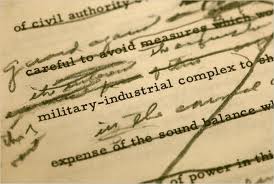January 17, 1961
IKE DELIVERS FAREWELL ADDRESS
Washington, D.C. (JFK+50) Tonight Dwight David Eisenhower, the 34th President of the United States, delivered his Farewell Address to the Nation on radio & television.
Three days from now, President-elect John Fitzgerald Kennedy will take the oath of office & become the 35th President of the United States.
President Eisenhower began his address with these words:
"After (a) half century in the service of our country, I shall lay down the responsibilities of office as...the Presidency is vested on my successor.
I wish the new President Godspeed.
I pray that the coming years will be blessed with peace & prosperity for all.
America is today the strongest, the most influential & most productive nation in the world (but) we recognize that America's prestige depends on how we use our power in the interests of world peace & human betterment."
President Eisenhower went on with a warning for the future.
"(Today) we face a hostile ideology (communism) global in scope. To meet it successfully there (must be) sacrifices which enable us to carry forward steadily, surely & without complaint."
The President indicated that there will be more crises which will lead to calls for "some spectacular costly action" but cautioned of the need for "maintaining balance."
He said:
"A vital element in keeping peace is our military establishment We have been compelled to create a permanent arm(s) industry of vast proportions.
This conjunction of an immense military establishment & a large industry is new in the American experience.
The total influence--economic, political, even spiritual--is felt in every city, every state house & every office of the Federal government."
The President continued:
"We must guard against the acquisition of unwarranted influence...by the military-industrial complex. The potential for the disastrous rise of misled power exists & will persist. We must never let this combination endanger our liberties or democratic processes."*
*This excerpt of the Farewell Address concerning the "military-industrial complex" was used by Oliver Stone in the introduction to his controversial movie "JFK".
More About Ike's Farewell Address
President Eisenhower's speech was the product of 21 drafts.
The warning about the "military-industrial complex" is significant in that Eisenhower was the only General to attain the Presidency in the 20th century & a career army officer who had retired as a Five Star General.
As President, Eisenhower cut the Pentagon's budget & records show that his defense cuts totaled $200 billion during his term of office.
Several weeks before his Farewell Address, Ike told several advisers:
"God help this country when someone sits in this chair who doesn't know the military as well as I do"
Eisenhower's speech was actually drafted by Ralph E. Williams, who relied on guidance from Political Science professor Malcolm Moos & the President's brother, Milton Eisenhower.
Melvin A. Goodman, a senior fellow at the Center for International Policy, wrote one year ago today:
"No president since Eisenhower has genuinely understood the degree of the Pentagon's increasing influence over national security policy."
Goodman wrote that Ike ignored the many Republicans & Democrats who advocated for increased defense spending & even cut the military budget by 20% between 1953 & 1955.
Goodman went on to write:
"....50 years later, we have...unprecedented military spending (&) continuous military deployments."
Goodman credited Ike for keeping America out of war (after the Korean Conflict ended) & "did not fall prey" to JFK's Bay of Pigs, LBJ's Vietnam, Reagan's Grenada, Bush II's Iraq or Obama's Afghanistan.
Melvin A. Goodman believed that President Eisenhower understood that too much spending on defense would "weaken both the economy & national security."**
**Source: Center for International Policy
History of Presidential Defense Budgets 1948-2012
1950: HST spent $200,000,000,000
1952: HST spent $600,000,000,000 (*UP $400 Billion)
1954: IKE spent $500,000,000,000 (*DOWN $100 Billion)
1960: IKE spent $400,000,000,000 (*DOWN $100 Billion)
1962: JFK spent $425,000,000,000 (*UP $25 Billion)
1966: LBJ spent $525,000,000,000 (*UP $100 Billion)
1974: NIX spent $400,000,000,000 (*DOWN $125 Billion)
1984: RR spent $600,000,000,000 (*UP $200 Billion)
1990: BUSH I spent $500,000,000,000 (*DOWN $100 Billion)
1998: WJC spent $ $375,000,000,000 (*DOWN $125 Billion)
2004: BUSH II spent $600,000,000,000 (*UP $225 Billion)
2008: BUSH II spent $700,000,000,000 (*UP $100 Billion)
2012: OBAMA spent $675,000,000,000 (*DOWN $25 Billion)
*The largest increase (1950-2012) was by Harry Truman (1950) +400 Billion.
The largest decrease (1950-2012) was by Eisenhower (1960) - $200 Billion
"This ballooning defense budget played a significant role in turning the budget surplus projected a decade ago into a massive deficit."***
***Source: Center for American Progress
www.thinkprogress.org
July 14, 2011
January 17, 2012
RON PAUL BOOED IN SOUTH CAROLINA DEBATE
Charleston, South Carolina (JFK+50) Texas congressman Ron Paul was booed by the audience at the Republican primary debate here in Charleston last night for his anti-military remarks.
Representative Ron Paul
Congressman Paul has repeatedly said that he if he becomes President he will close US military bases overseas & reduce spending by the "military-industrial complex."
Paul said last night:
"(There is) this idea that we can't debate foreign policy, then all we have to do is start another war? This country doesn't need another war. We need to quit the ones we're in. We need to save the money & bring our troops home."
JFK+50 wonders if President Eisenhower would agree?


